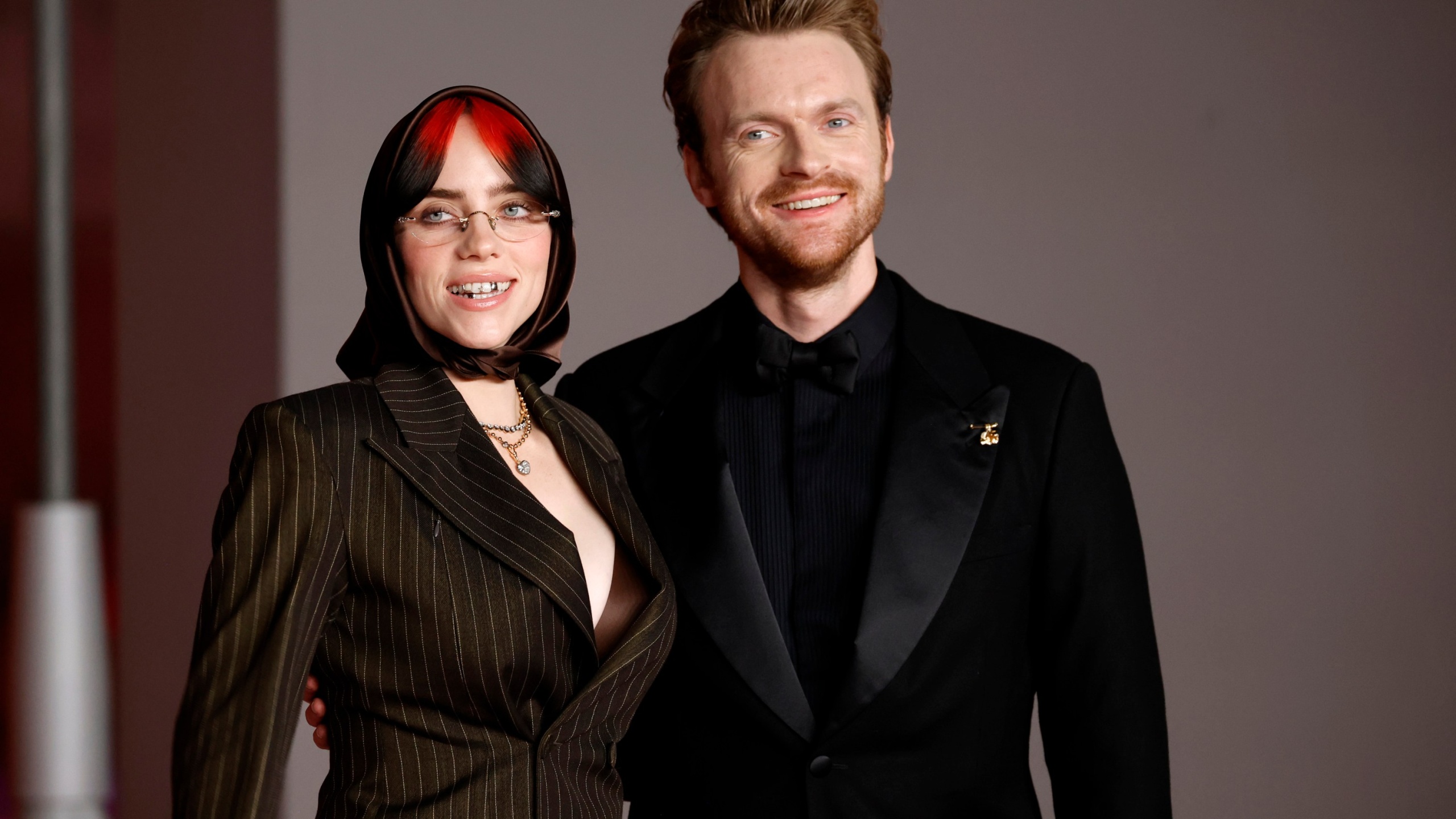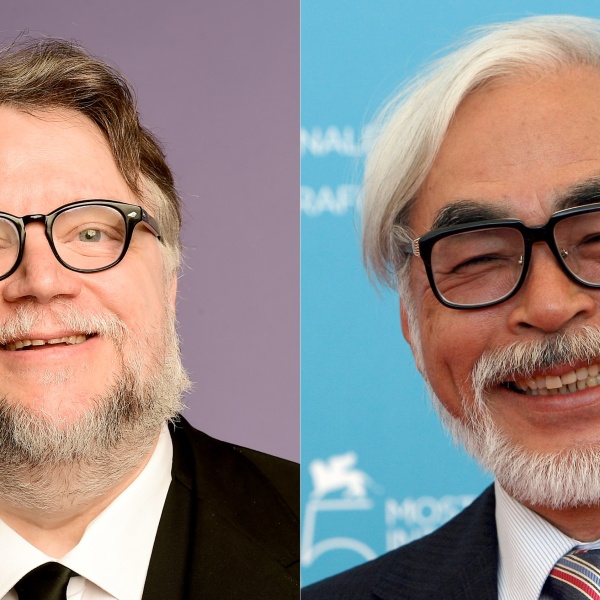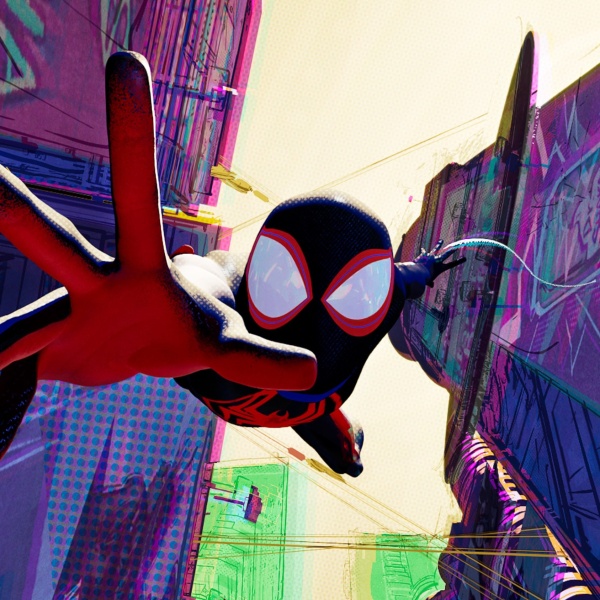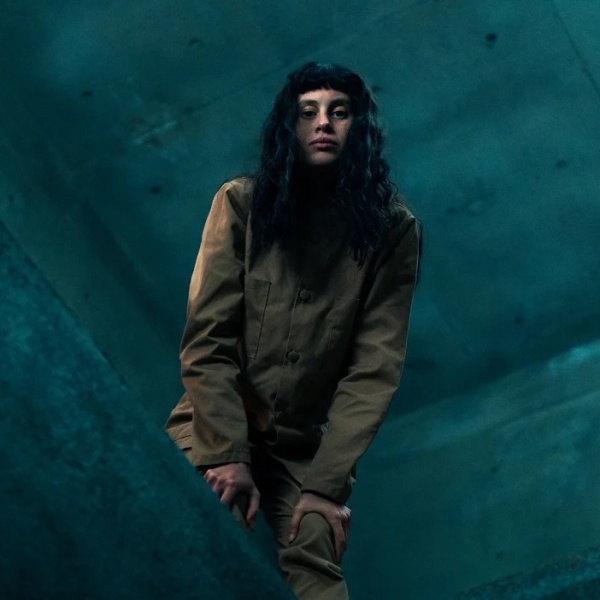
Superstar musician siblings Billie Eilish and Finneas have felt an ease to their “Barbie” experience that was absent from the previous film work that won them an Oscar for Best Original Song in 2021. “It was the first time ever that we’ve done anything without our whole team with us, backing us up and doing all the communicating for us,” said the “Happier Than Ever” singer to IndieWire over Zoom, beaming in from a Los Angeles recording studio where she’s seated next to her brother, the youngest person to have won the Grammy for Producer of the Year, Non-Classical. “We were child sensations. We had to have adults in the room translating for us,” said Finneas with a laugh.
Eilish compared the pair, both of college age at the time, auditioning for the chance to write and perform the theme for James Bond film “No Time to Die,” the eventual award winner, to being put in “a room of dancers getting ready to be on the big tour,” or “the opening of ‘Triangle of Sadness,’” as her brother put it.
The way their “Barbie” song “What Was I Made For?” came about was simply a game of telephone, where one of their colleagues had met with a Mattel executive who’d boasted about the still unreleased film, which led into a haphazard discussion about if they had any interest in becoming involved with it. Upon Finneas saying “Maybe,” he was put in touch with “Barbie” composer Mark Ronson for a quick chat, which led into him looping in Eilish, Ronson looping in filmmaker Greta Gerwig for the four of them to all get on the same page, and shortly after that, they were set to come in for a screening where they would get to see the highly anticipated Warner Bros. release six months in advance. “It was very direct,” said Eilish.
Obviously now, “Barbie” has become a phenomenon, earning over a billion dollars at the box office, making it the top grossing film of 2023, but all the way back at the beginning of the year, when the opportunity to write a song for it first came up, Eilish and Finneas were just as quizzical about what exactly would it even look like, and furthermore, how would their often haunting music fit into the picture.
“We were like, ‘Wait, what?’ We didn’t know where anything was going to go. ‘What is this movie even about? What’s the deal? Are we going to be able to write something that would make sense? Do we even fit? Does it make any sense?,’” said the young singer. “I remember when it was announced that I was going to have a song on the Barbie soundtrack, the internet was kind of clowning it,” her brother cutting in to echo “Why does the Barbie movie need the saddest song?” While at that point, she delighted in the dramatic irony, confident of just how well “What Was I Made For?” fits within the context of the film’s climax, but before her and Finneas’ first “Barbie” screening, “I had the same idea that the internet had,” she said.
“I’m not going to make an upbeat happy little anthem. That’s just not interesting to me. Leave that to somebody else,” said Eilish. “I was definitely going into it being like, ‘Oh, I don’t think this is going to happen. I don’t know how it would work. I just want to see it. ‘Let’s go see it.’ And honestly, it was obviously so unbelievably moving that after seeing it, I was like, ‘Damn, I really want to be part of it.’ I would’ve been really disappointed if we hadn’t written anything good.”
And there were absolutely no guarantees they would, as the sibling collaborators were both going through crippling writer’s block during the initial stages of working on Eilish’s upcoming third studio album. Just by taking a break from the frustration to give the assignment of writing a heart song for Margot Robbie’s Barbie, that would play in the climax of the film, they stumbled upon the soundtrack cut that not only a current Golden Globe and Critics Choice Award nominee, but overhauled their approach to making their own record.
“The album that we’ve been making all year that we’re nearing the end of, is not 100% every word autobiographical, obviously. We’re always trying to write the best song, and the best song isn’t always 100% the truth,” said Finneas. “But I will say what happened [when] we sat down to write the ‘Barbie’ song, we thought, ‘This doesn’t have to have anything to do with us. We’re writing a song for Barbie.’ And then we wrote a song that Billie felt like had everything to do with her and had everything to do with how she felt… Then we started writing a really autobiographical record.”
Turning to his sister, he said “You were going through a transitional period in your life, where you were like, who am I, who was I, who will I be?” “It was horrible,” said Eilish. “And I think that the ‘Barbie’ song, it kind of illuminated, ‘Oh, I’m feeling this and this and this and this. I can write from those feelings.’” It’s become a departure from the “What I Was Made For?” singer’s usual creative process. “I would not have been able to write that song had we just been like, ‘Let’s write a song about how we feel.’ It wouldn’t have happened. That song wouldn’t have been written,” she said. “For me, if we sit down and try to write how I feel, I’m like, ‘Yuck.’ It’s just really hard for me to see [things] in the moment. It’s easier to write in hindsight. I feel like we’ve had success writing about our own lives later.”

Getting into the nitty-gritty of their songwriting style, Finneas starts with “a metaphorical, hopefully poetic, ambiguous line.” He said “The line I always reference that I didn’t write is [in] a song by Bon Iver called ‘33 “God”.’” There’s a line in it, ‘A child ignored. These will just be places to me now,’ and it has no kind of preamble. That’s just the line, ‘These will just be places to me now.’ And to me that conjures such a sense of somewhere you go that is so important to you, the house you grew up in, or the bar that you fell in love at, or whatever it is, and then your life changes and evolves and none of that’s true anymore. You go, ‘It’s just a place now.’ It has nothing to do with, ‘It’s so special because I’ve met the love of my life here.’ It didn’t work out. The songs that I’m most proud to have written oftentimes are a little abstract.”
Eilish’s early hit “When the Party’s Over” was “coming from a place of how you felt, but the situation you were in was not that situation at all,” said the singer to her brother. The first songs they ever wrote together, “Bellyache” and “Hostage,” were “complete made-up stories, but they work so well and you relate to them, and we related to them,” despite the former being about killing one’s friends, and the latter being about wanting to be in control of a loved one. “All fantasy and metaphors,” she said.
How it relates back to “What Was I Made For?” is how “there’s these lines [in the song] that are totally metaphors that happened to also be to picture,” said Finneas. “‘I used to float and now I just fall down’ is exactly what I’m talking about. ‘Taking a drive, I was an ideal, looked so alive, turns out I’m not real,’ all these things that are totally character points [for Barbie]. When Billie plays a show, the people in the audience crying and singing along to these songs are internalizing them. They’re looking at them through the lens of their own existence, of ‘When did I stop enjoying my life?’ And ‘I can’t tell my boyfriend.’ These kinds of abstracts.”
A motif that’s become associated with “What Was I Made For?” is a montage of photos and home videos representative of how the participants came into womanhood like Margot Robbie’s Barbie eventually does following the sequence in the film. It is again somewhat unintentionally apt for Eilish to be the one soundtracking these clips, as she herself has been in the public eye since she was 13 years old, which “made for a lot of identity crises,” she joked.

In a time where fans often refer to each one of a pop star’s album cycles as an “era,” entering into the music business at such a young age has made those creative resets come much more naturally to Eilish, however she may initially resent it. “It’s shocking and really upsetting to realize that they were all right when they said, ‘You’ll understand when you’re older.’ I can’t tell you how infuriating that is to me because I used to hear that all the time, and [now] I’m like, ‘Damn, it is kind of true, man.’ I look back and I’m proud of myself for being strong in being really young and getting really famous and sticking to what I thought was right for me, but it’s really hard. And yeah, it naturally makes you have new eras because you’re just older. But then it’s kind of unfair. I can never, ever get away from the fact that everything that I thought was cool and made when I was 14 and 15 and 16 and 17 and 18 is just out in the world forever, for everyone to see, and I can’t do anything about it.”
In late November, Eilish had a creative meeting just to express to her team what direction she sees herself going in. “I was just talking about artists I love, and talking about things I love to everyone. And I was looking at certain artists’ discography, and all of their videos, and some people that I love started out when they were already in their 20s, and so everything they have made is really cool,” she said. “And I am definitely irritated that I just was 14, so everything that I did was a 14-year-old doing it. And even if it was cool, it’s still like, ‘Oh my God.’”
“You’re so blind to it. And obviously, we’re still blind to it,” said Finneas, chiming in. “When I think I have a good idea, I’m like, ‘That’s a really good idea.’ I’m not thinking, ‘Am I going to think that’s a good idea when I’m 30?’” If anything, getting older comes with the trade-off of more wisdom, but less ability to change “in terms of opinion and taste and whatever,” said the elder sibling. “The amount you’re changing from 12 to 13 is exponential… 21 to 25 is way less. As they both go deeper into their 20s, Eilish turning 22 years old on December 18, “you figure yourself out in sort of longer increments,” said Finneas.

Time will tell if their existential ballad making waves in the awards race will mark the endpoint of their artistic metamorphosis, but their “Barbie” experience has gotten the creative juices flowing. “Every time we do anything in another world, it’s just very inspiring in so many ways, like, ‘Damn, what could we do? What could we make happen?,” said Eilish. “It feels like training in a way. It feels like we’re working on a muscle that we really want to be bulky.” Even past the music part, their collaboration with Greta Gerwig has them ready to direct their own projects, with Finneas, who already does quite a bit of film and TV scoring on the side, even considering helming a movie musical.
“Everything about ‘Barbie’ has felt very much like family. The way that Greta talked to us from the very beginning, I think of Greta as a cousin,” said Eilish. “She’s so humble about everything, and she’s clearly such a fan.” Using that word in a general sense, identifying themselves as fans as well, Finneas appreciates the lack of ego driving Gerwig’s work. “When you allow yourself to be referential and pay homage, and be inspired by [things], that just takes humility,” he said, citing the nod to “2001: A Space Odyssey” in the “Barbie” opening. “Billie, especially her visual language, is very referential.”
“I never go around and be like ‘I invented everything.’ And ‘I’m not inspired by anything,’” said Eilish. “I will never ever not give credit where credit is due to the things that inspired me.” Finneas added that whether or not they’re upfront about it, “This filmmaker you think is so brilliant is referencing this filmmaker, who’s referencing [this one]…” He said, “I always think that I’m the most creative, or I’m making something the most unique when I’m referencing something from a different medium. If I’m trying to make a song that reminds me of a painting, then I’m doing a good job.”
Hence why the entire process of writing, performing, and promoting “What Was I Made For?” has become so pivotal for the pair. “People have said to me sweet things like, ‘Oh, your song makes that scene even better.’ And I’m always like, ‘That means a lot. But man, was the movie moving before our song was in it. We saw it without [it],” said Finneas. Eilish had even been feeling like the general quality of cinema had declined in the past few years, “but then something comes along like Greta Gerwig’s ‘Barbie,’ and it’s just like, ‘Damn, dude! Ok.’ There’s still people with real passion and real talent out here.”





